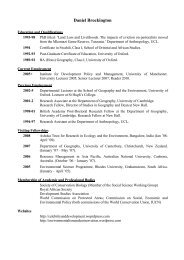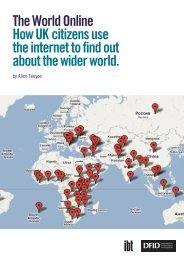World
Viewing the world - Full report
Viewing the world - Full report
- No tags were found...
Create successful ePaper yourself
Turn your PDF publications into a flip-book with our unique Google optimized e-Paper software.
This autumn (the WTO) will begin a push, backed bymany of the richest nations, to extend its powers evenmore. And some 700 organisations from 73 countrieshave sworn to stop it. Ranging from big outfits such asOxfam, Friends of the Earth and the JapaneseConsumers’ Union to small grassroots networks in theThird <strong>World</strong>, they have signed a joint declaration tooppose any effort to expand the powers of the <strong>World</strong>Trade Organisation, saying that it has worked ‘to priseopen markets for the benefit of transnationalcorporations at the expense of national economies,workers, farmers and other people’. (Geoffrey Lean,Independent on Sunday, 18.7.99, p13)The four largest sections of the coverage – referencesto the crisis, responses and developments, potentialconsequences, and most references to the WTO –accounted for 79% of television news output on thebanana dispute. While a great deal of information wasavailable amongst this coverage, little of it involvedexplanation. Where some form of explanation wasavailable it was in discussion of the relative power andinfluence of the producers of bananas, in relation togovernments and to the WTO. The smallest section ofthe coverage concerned wider economic references,including the fact that there are separate and potentiallyconflicting principles involved in the drive for free tradethroughout the world.C.2.2. Nigerian Presidential ElectionsThe Nigerian presidential elections were held on 27February 1999. These democratic elections hadparticular significance after 15 years of military rule inthe country.C.2.2.1. Sample and BackgroundThere were 13 relevant bulletins in the sample from theweek of the elections, between 25 February and 1 March,including at least one each from the five terrestrialchannels. Additional news programmes examined werethree BBC1 bulletins from mid-February, providinginformation about conflict over oil wealth in thecountry, and also the only bulletin covering the Nigerianparliamentary elections, already held on 19 February.Cable/satellite channels were not analysed during thisperiod.ITN and Channel 5 provided the briefest coverage.Newsnight highlighted the circumstances of Nigeria’s Ibopeople in a special report on 1.3.99. BBC1 covered theelections (and related stories on Nigeria) mostfrequently, with a total of 8 bulletins. Channel 4 providedthe most in-depth coverage of the election, includingbackground reports on the protest of the Ijaw people inthe Delta, and on conflict between the North and Southof the country. Channel 4 also ran a series of video diariesfrom Nigeria, Lagos Stories, on five evenings of the weekof the elections, following its 19.00 news broadcasts(see E.3.2.2. Asia, Africa and Latin America). Channel4’s accompanying website (www.channel4.com/nextstep/lagos_stories/recent.html) provided useful backgroundinformation on Nigeria’s recent history,summarised as follows.Nigeria obtained independence from Britain on1 October 1960. A federal government was formed. In1966 a group of army officers killed the prime minister,overthrew the federal government and installed acentralised government. In an unstable political climate,regional and ethnic tension flared. In 1967 Nigeria wasdivided into 12 states. The massacres of Ibo peoples inthe north led to the declaration of a separate Republic ofBiafra. This declaration marked the start of a three-yearcivil war in which more than a million – mainly Biafrans– died. The war ended in 1971 with the surrender ofBiafra.During the 1970s and 80s Nigeria saw a succession ofmilitary coups and governments. At the same time the oilindustry boomed, with only a tiny minority of Nigeriansbenefiting. In 1985 General Babangida became the firstmilitary president, promising to restore democracy.Eventually, in 1993, Nigerians went to the polls, whenChief Abiola was voted president. However, Babangidaannulled the elections. In the ensuing political crisis,General Sani Abacha seized power and suppressed anyopposition to his government.In 1993, 300,000 Ogoni people marched in protest atthe money being made from their oil-rich lands, whichwere being exploited by the Anglo-Dutch consortiumShell. The march marked the start of a period of militaryterrorisation of the Ogonis. The plight of the Ogonis wasbrought to the world’s attention in May 1994 when theenvironmentalist and writer ken Sara Wiwa was arrestedwith other Ogoni leaders on fraudulent charges. InNovember 1995 Ken Saro Wiwa, along with eight Ogonileaders, was executed. Abacha died in June 1998, followedrapidly by the death of Abiola in custody. GeneralAbubakar became the interim president, and the 1999presidential elections took place some eight monthslater.C.2.2.2. ResultsThe following table indicates the range of informationavailable on television news on the Nigerian presidentialelections. The table also indicates the frequency of each36 DFID – July 2000





